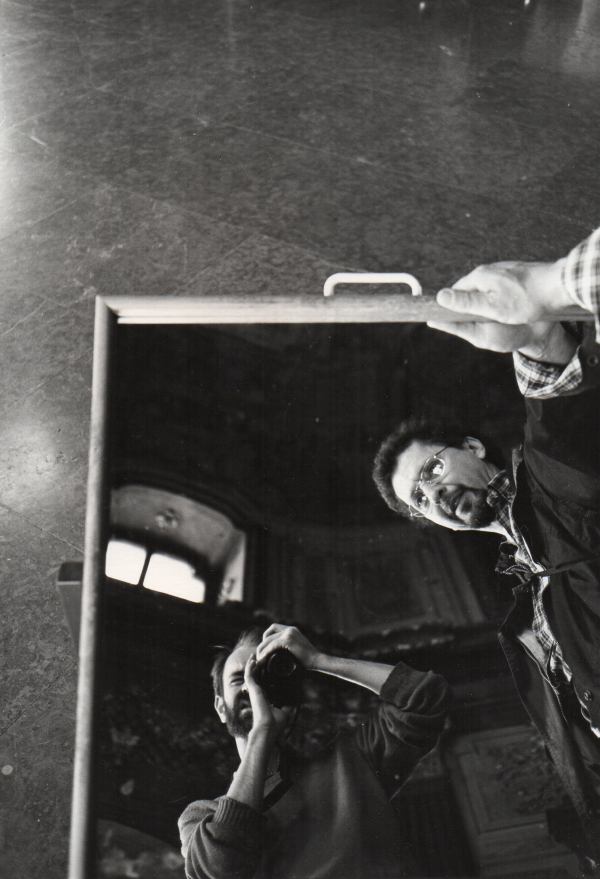Teo Hernández & Andrea Ancira

- Pascal Martin, Portrait of Teo and Pascal, Paris, Courtesy of Artemisa Hernández.
Teodoro Hernández was an artist, filmmaker and writer, born in Hildago (Mexico). During his architecture studies at the National Autonomous University of Mexico, he founded the Experimental Cinematography Center (CEC). In 1960, the French Institute of Latine America (I.F.A.L) funded the first project of the group : a documentary on the institute’s cultural activities. The film remained unfinished and the group dissolved. In 1966, he settled in Paris. From 1968 to 1970, he produced films in Super 8 in London, Paris, several Marocan cities (Tangier, Essaouira and Zagora) and in Copenhagen. Then, together with Michel Nedjar, he produced Michel là-bas in Marocco (march-april 1970), and traveled during six years through North Africa, Europe, Turkey the Middle-East, India, Nepal and Central America. In 1976, back in Paris he produced Salomé and the next year took part in Jeune Cinéma collective in Paris. In 1977, he produced Cristo, which is part of a serie about the Passion with: Cristaux (1978), Lacrima Crtisti (1979-1980) and Graal (1980). With his fellows cine-artists Michel Nedjar, Jakobois and Gaël Badaud, he created in 1980 the experimental film collective the MétroBarbèsRochechou Art. His work was shown at Cinémathèque française in 1979, and in 1984, Centre Pompidou dedicated to him a restrospective exhibition. In the 80’s, interested by the links between image, movement and bodies, he collaborated with Catherine Diverès and Bernardo Montet’s dance troup, Studio DM. Together with them, he created a practice mixing cinema, literature and dance. Teo Hernández was also a photograph and a writer (poems, notes, thoughts about cinema, literary collaboration within several journals). Living with AIDS, he passed away on the August 22, 1992, buried at Père Lachaise (Paris). From the end of the 1960’s until his death, he produced more that 100 films, most of them in Super 8.
Shortly before dying, Teo Hernández bequeathed his film work and personal files to Michel Nedjar, who donated it to Centre Pompidou for its conservation and dissemination. Since then, the films are part of the cinema collection and the documentary collection of the Kandinsky Library, constituted as Fond Teo Hernández.
Andrea Ancira : Writer, editor and researcher. She has conducted and coordinated seminars on Critical Theory and Marxism, Sound ethnographies and Sound Art practices, and Politics of the Archive in academic programs of museums and universities in Mexico. She has worked as a researcher in the Ministry of Culture in Mexico, as curatorial assistant at the University Museum of Contemporary Art (MUAC) in Mexico City, and as associate curator at Centro de la Imagen. In 2016, she received a curatorial research grant from Jumex Foundation and was the first resident of the Pernod Ricard Fellowship at Villa Vassilieff in Paris. In 2017, with the support of the Board of Contemporary Art (PAC), she was part of the Curatorial Program organized by Independent Curators International (ICI) in New Orleans. In 2018, she was invited to assist the coordination of the Curatorial Program of ICI in Mexico City and participated in the School of Art Criticism of La Tallera / Siqueiros Project. She is currently Editorial Coordinator of Buró-Buró. Her line of research focuses on the role of experimental artistic practices in the configuration of identities, sensibilities and social discourses. By examining these practices, whether in the field of sound or image, she has approached them from their possible implications in shaping the commons. The perspective from which she explores these phenomena is based on multiple theoretical frameworks such as Marxism, the history of contemporary culture and politics, feminism, decolonial studies, among others. She has collaborated in academic and dissemination publications of social sciences and contemporary art.
Partager